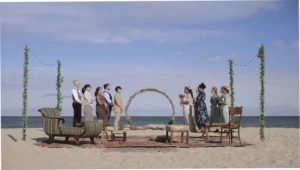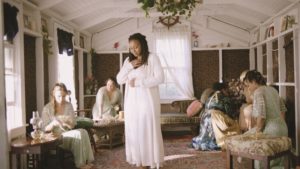Boston Lyric Opera’s production of composer Ana Sokolovic’s Svadba begins not with music but with the sound of the wind at Truro’s Ballston Beach where it was filmed in October.
As the opera unfolds, the libretto — a mixture of Serbian and made-up language — begins to meld with the natural world. The tongue-twisting singing, full of whispers, shooshing, rolled “R”s, even nursery rhymes, complements the sounds of crashing waves and seagulls.

Indeed, while Svadba was filmed close to home, it has many elements that are strange and foreign. The opera, whose title means “wedding” in Serbian, is about prenuptial rituals. It follows bride-to-be Milica over the 24 hours before her wedding. But really the opera is about being on the precipice of change, a theme reinforced by the liminal duneside setting. (In one scene, you can even see the house that now stands precariously on stilts at Ballston.)
The hour-long opera, directed by Shura Baryshnikov and conducted by Daniela Candillari, is available for streaming at operabox.tv for $15. Svadba has been previously staged by the San Francisco Opera and Festival d’Aix-en-Provence. But here, Baryshnikov, daughter of the famed dancer and choreographer, opts for something more experimental. Each character is doubled: played by both a dancer on a set, and a singer in a black-box theater. Visual footage switches between the two dimensions.
The soundtrack stays constant. There is no lip-synching, so it is sometimes not clear which character is “singing.” There are interesting diegetic and nondiegetic moments. (“Diegetic” refers to music in a dramatic production that is heard by the characters in the play or film.) In one dance sequence, the tapping sounds do not line up with the dancers’ bare feet. There’s also a dissonance between the haunting music and the dancers’ joyous expressions and movements.

There isn’t much plot, aside from activities such as hair dyeing, picking flowers, and making rose hip jam. The text is evocative rather than illuminating. “Tomorrow you will wed, leaving your home behind,” sing Milica’s bridesmaids. “Your mother will weep, and we will console her.” Time doesn’t always operate linearly. In one scene, Milica, sung by Chabrelle Williams and danced by Victoria L. Awkward, enters a daydream about her betrothed, played by the starry-eyed Olivia Moon.
Despite this, Svadba has many appealing aspects. The score is influenced by Balkan folk music set within a contemporary idiom. It is nearly a capella, except for some light percussion and rainstick. The ocarina is featured in one song about a nightingale. There are some mind-boggling vocal gymnastics by Mack Wolz and a plangent aria sung by Williams.
The film is also visually satisfying. The Boston Globe perhaps unfairly compared the beach house in which the interior shots were filmed to a “Pinterest board.” Full of antique furniture, flowers, and fruit, it looks more like something out of Wes Anderson. Or maybe even the Mary Heaton Vorse House.

In one scene, the bridesmaids — danced by Sasha Peterson, Emily Jerant-Hendrickson, Sarah Pacheco, and Jay Breen — strip down to their underwear and pirouette through the (presumably freezing) sand. But the highlight of the opera is an energetic dance sequence by Breen that seems to combine African dance influences with flapper-like abandon.
The culmination of Svadba is the wedding between Milica and her betrothed. The scene is dreamlike and colorful as the two families step out onto a rug rolled over the sand. And it’s not just any wedding: it’s a queer wedding, an aspect irrelevant to the plot, but still nice.
Perhaps Svadba’s greater significance is that it is one of several experimental micro-operas released for streaming during the pandemic. There are similarities to Angélica Negrón’s The Island We Made, starring drag queen Sasha Velour and released by Opera Philadelphia last year, which also dips into issues of queerness and synchronicity. Svadba, too, aims to redefine what opera can be.
